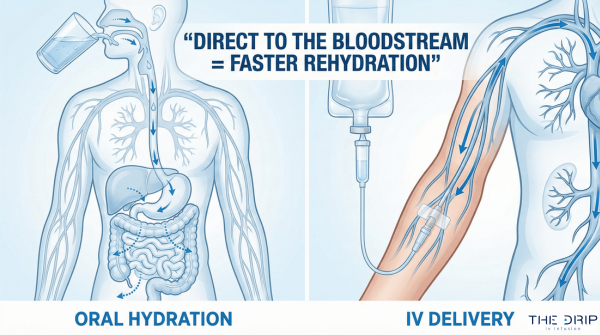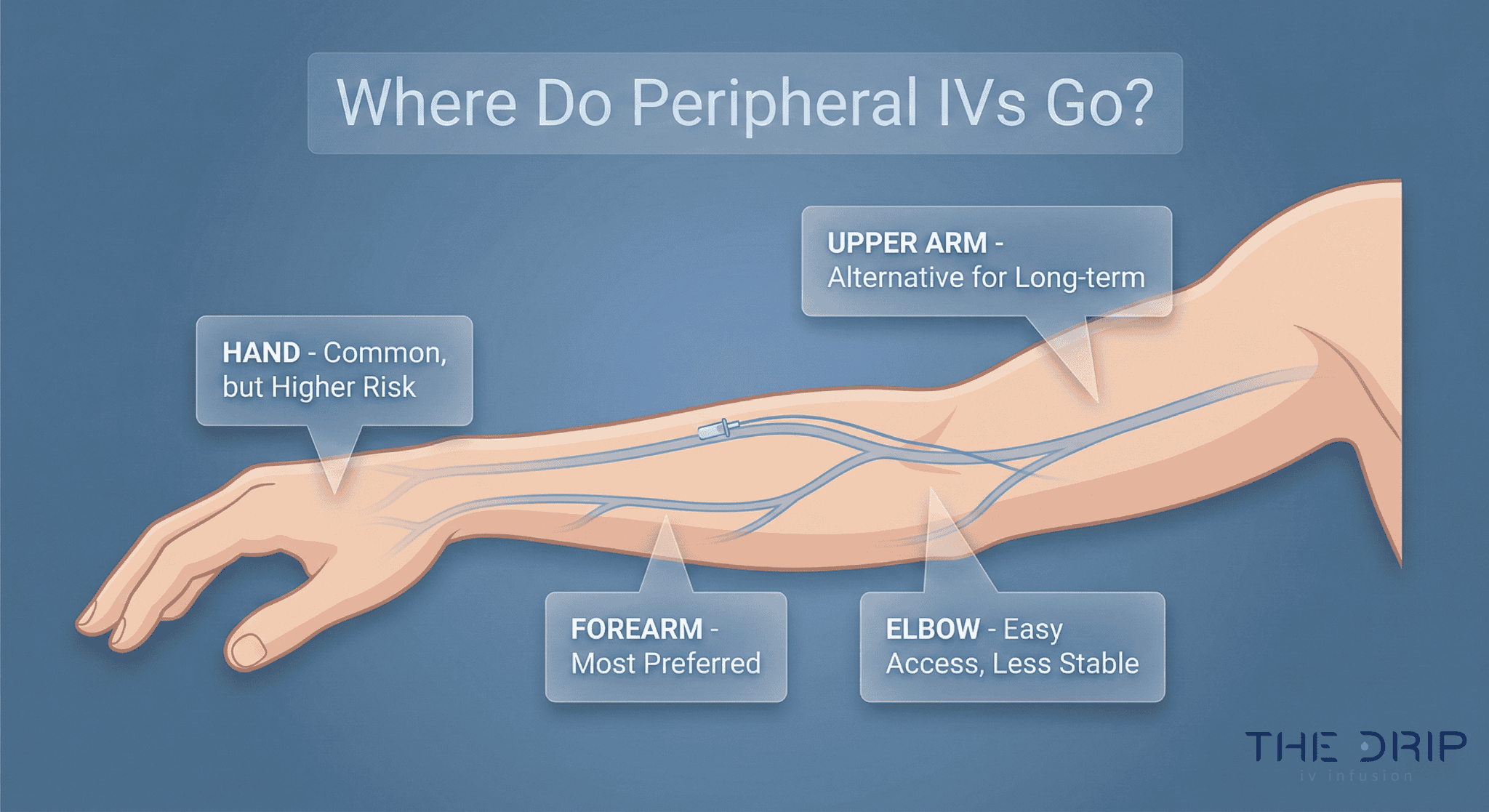Are you dealing with terrible morning sickness that won’t quit, throwing up everything you try to eat, or wondering if what you’re going through needs a doctor’s help? You’re in exactly the right spot to figure out when your body needs IV fluid help during pregnancy and what your options really are.
Think of intravenous (IV) fluids during pregnancy like a direct pipeline to your bloodstream – they deliver the water, salts, and nutrients your body desperately needs when your stomach just won’t cooperate or when pregnancy throws you some serious curveballs.
TL;DR Summary: We’ll dig into the different IV fluids doctors use for pregnant women (like normal saline and lactated Ringer’s – sounds fancy but they’re just balanced salt water), figure out which pregnancy problems might need IV help (from severe morning sickness hitting up to 3% of moms-to-be to scary emergency situations), understand how doctors keep you safe during treatment, learn about special amino acid drips when your body needs serious nutritional backup, and help you make smart choices with your healthcare team.
Quick Tip: If you’ve dropped more than 5% of what you weighed before getting pregnant or can’t keep anything down for a full day, call your doctor right away – these are red flags that your body might need IV help.
Throughout this guide, we’ll walk you through everything about IV fluids during pregnancy, from knowing when they’re actually necessary to exploring safer alternatives and making informed decisions with your medical team.
What Are IV Fluids and How Are They Used in Pregnancy?
IV fluids are clean, sterile solutions that go straight into your vein through a tiny tube to get your body hydrated, fed, or medicated when pregnancy makes eating and drinking nearly impossible. Think of it like bypassing a clogged drain – when your stomach won’t work right, doctors can deliver what you need directly to where your body can use it. Medical experts follow specific rules about fluid management based on how far along you are and what’s going wrong.
What Types of IV Fluids Are Commonly Given to Pregnant Women?
Different IV fluid types serve different purposes in pregnancy, depending on hydration needs, calorie needs, and electrolyte requirements.
| Fluid Type | Primary Purpose | Key Components |
| Normal saline | Hydration, morning sickness | Sodium chloride |
| Lactated Ringer’s | Electrolyte balance, labor use | Na, K, Ca, lactate |
| D5W (sugar water) | Calories + hydration | 5% dextrose in water |
| Amino acid mixtures | Full nutrition when not eating | Amino acids, fats, sugars |
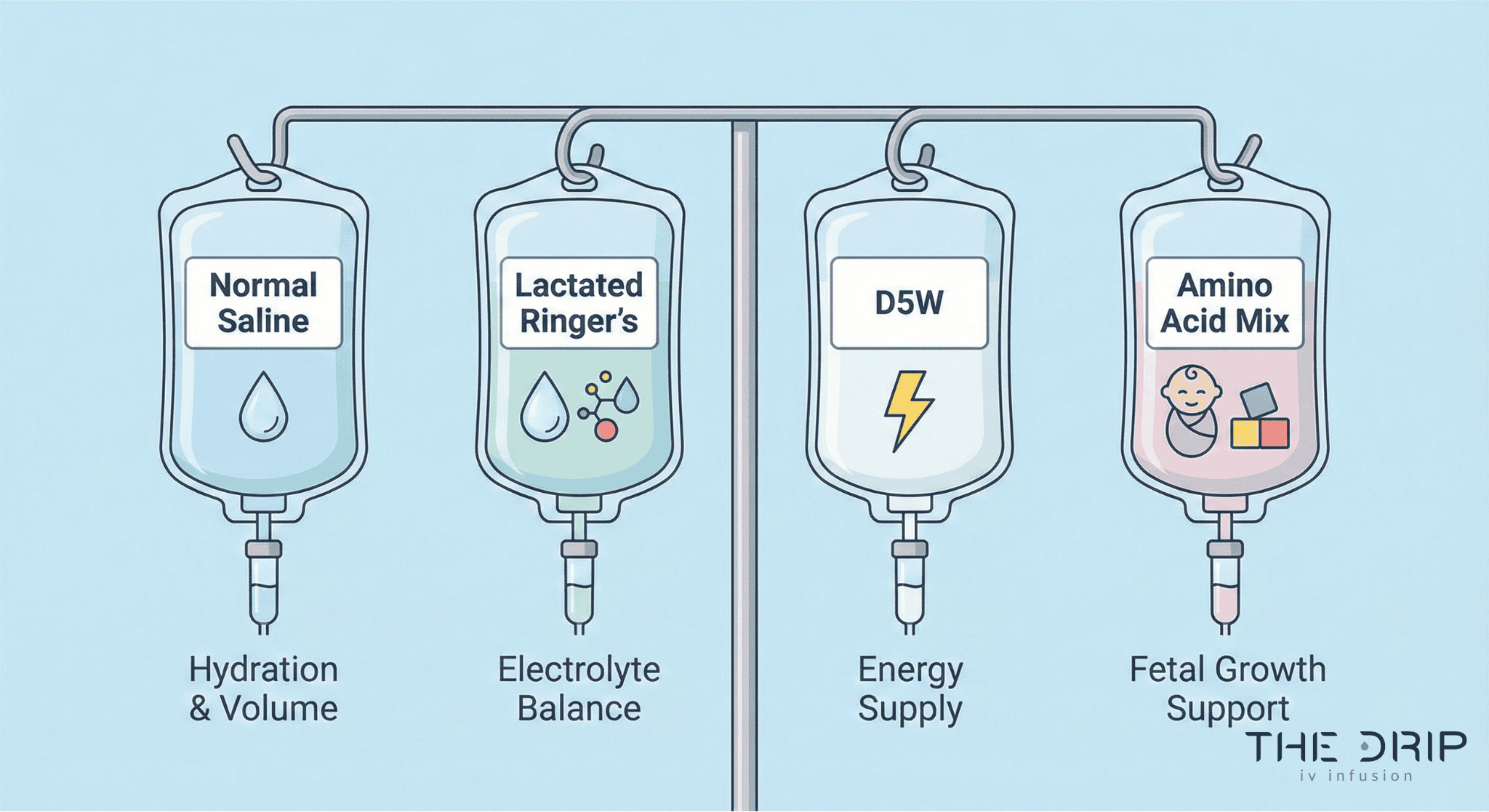
When Might a Doctor Recommend IV Fluids for Pregnancy?
Your doctor might suggest IV fluids when throwing up gets so bad you can’t keep anything down. Severe morning sickness, called hyperemesis gravidarum, is the biggest reason pregnant women end up in the hospital early on – it happens to about 1 in every 30 to 300 pregnancies. When you’re admitted, doctors typically start with a big dose of up to 2 liters of fluid over 2 hours to get you back on track.
Sometimes your amniotic fluid gets too low, and one liter of salt water can bump those levels up nicely. Emergency situations like heavy bleeding after delivery or serious infections need aggressive fluid treatment to keep your organs working properly, much like how your car needs coolant to prevent the engine from overheating.
What Are the Signs of Dehydration During Pregnancy?
Doctors look for specific measurable markers to confirm dehydration during pregnancy.
| Marker | Threshold | Clinical Meaning |
| Weight loss | >5% of pre-pregnancy weight | Significant dehydration |
| Urine ketones | Positive test | Body burning fat for fuel |
| Urine output | <100 mL/hour | Inadequate hydration |
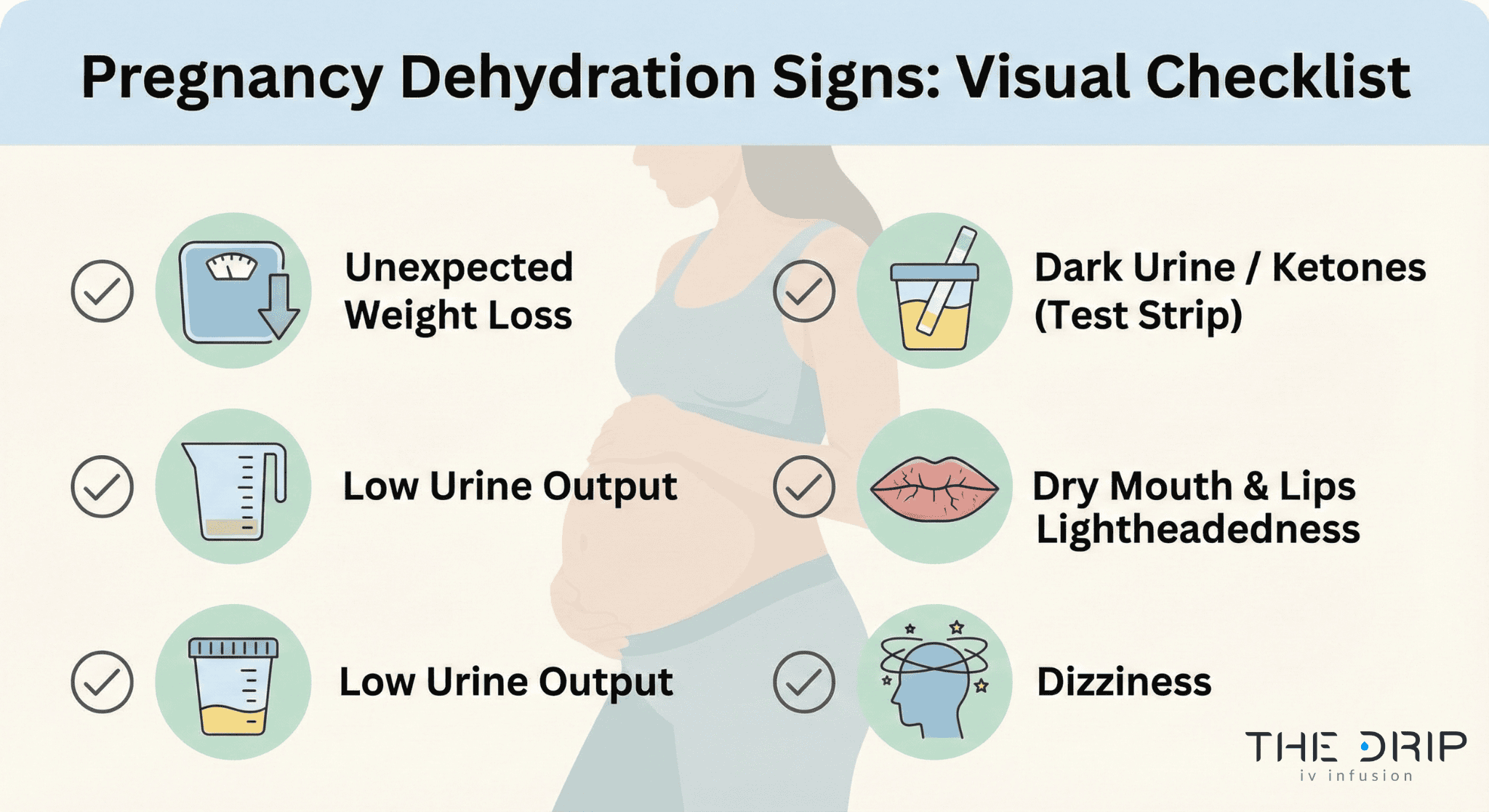
What Pregnancy Conditions or Complications Can Require IV Fluids?
Pregnancy problems that need IV fluids range from awful morning sickness to life-threatening emergencies. Severe morning sickness affects up to 3% of pregnancies and is the top reason women get hospitalized early in pregnancy. But beyond feeling sick, infections and scary situations like massive bleeding after delivery or dangerous infections can require immediate fluid rescue.
How Can Morning Sickness or Hyperemesis Gravidarum Lead to IV Treatment?
Hyperemesis gravidarum leads to IV treatment because the constant vomiting causes severe dehydration and weight loss that drinking alone cannot correct. Doctors aim to keep your pee output above 100 mL per hour, which is like making sure your body’s plumbing system stays flowing. You also need thiamine (a B vitamin) to protect your brain from damage.
A study from way back in 1995 found that getting IV treatment at home costs about a quarter of what hospital treatment costs ($708 versus $2,701). Treatment continues until you can eat and drink normally again and those ketones disappear from your urine.
What Role Do IV Fluids Play in Treating Infections or Other Illnesses in Pregnancy?
IV fluids become crucial when you’re fighting infections during pregnancy – they’re like reinforcements helping your body’s defense system. When a serious infection causes shock, you need aggressive fluid replacement to keep all your organs getting enough blood flow. IV antibiotics work better when they’re delivered with plenty of fluid, kind of like how medicine goes down easier with a glass of water, but more critical.
These fluids keep your blood pressure and circulation stable while your body battles the infection, giving your immune system the support it needs to do its job effectively.
Are IV Fluids Used to Address Preterm Labor or Other Obstetric Emergencies?
Yes. IV fluids are used to address preterm labor and other obstetric emergencies because they provide immediate volume support during critical situations such as heavy bleeding after delivery. It’s like emergency roadside assistance for your circulatory system—you need immediate volume replacement to keep everything running.
A 2024 study found that getting lots of IV fluid during labor (2500 mL or more) didn’t prevent bleeding problems after delivery. Interestingly, that same study showed high-volume IV fluids during labor nearly doubled your chances of needing a C-section..
Is IV Therapy Safe During Pregnancy?
Yes. IV therapy is considered safe during pregnancy when it is administered with appropriate monitoring and trimester-specific precautions. Your medical team has specific guidelines to keep both you and your baby safe during treatment.
What Precautions Are Taken to Ensure IV Therapy Safety for Expectant Mothers?
Safety precautions for IV therapy in pregnant women include different approaches for each trimester and constant monitoring. Early pregnancy protocols stick with salt water plus potassium while avoiding sugar solutions for dehydration. Later in pregnancy, especially if you have high blood pressure, doctors are more careful with fluid amounts to prevent fluid backup in your lungs.
Your healthcare team watches your vital signs and pee output like a hawk, aiming for more than 100 mL per hour during treatment. They check your blood salts daily during ongoing IV therapy to catch any imbalances before they become problems, much like checking your car’s oil level regularly to prevent engine damage.
Are There Any Risks or Side Effects of IV Fluids During Pregnancy?
Yes. There are risks and side effects of IV fluids during pregnancy, including fluid overload, electrolyte imbalances, and increased cesarean delivery risk. IV fluids can be lifesaving, but they also carry real risks that doctors carefully monitor. These complications are especially relevant later in pregnancy or during labor.
- Fluid overload
- Lung fluid backup
- Sodium imbalance
- Mineral disturbances
- Increased C-section risk
- IV line infection risk
Too much fluid can cause backup in your lungs, which is especially dangerous later in pregnancy. Large amounts of salt water can mess with your body’s acid balance. Wrong fluid choices can cause sodium levels to drop too low. High-volume IV fluids during labor nearly double your risk of cesarean delivery. Long-term IV therapy carries infection risks from the IV line itself.
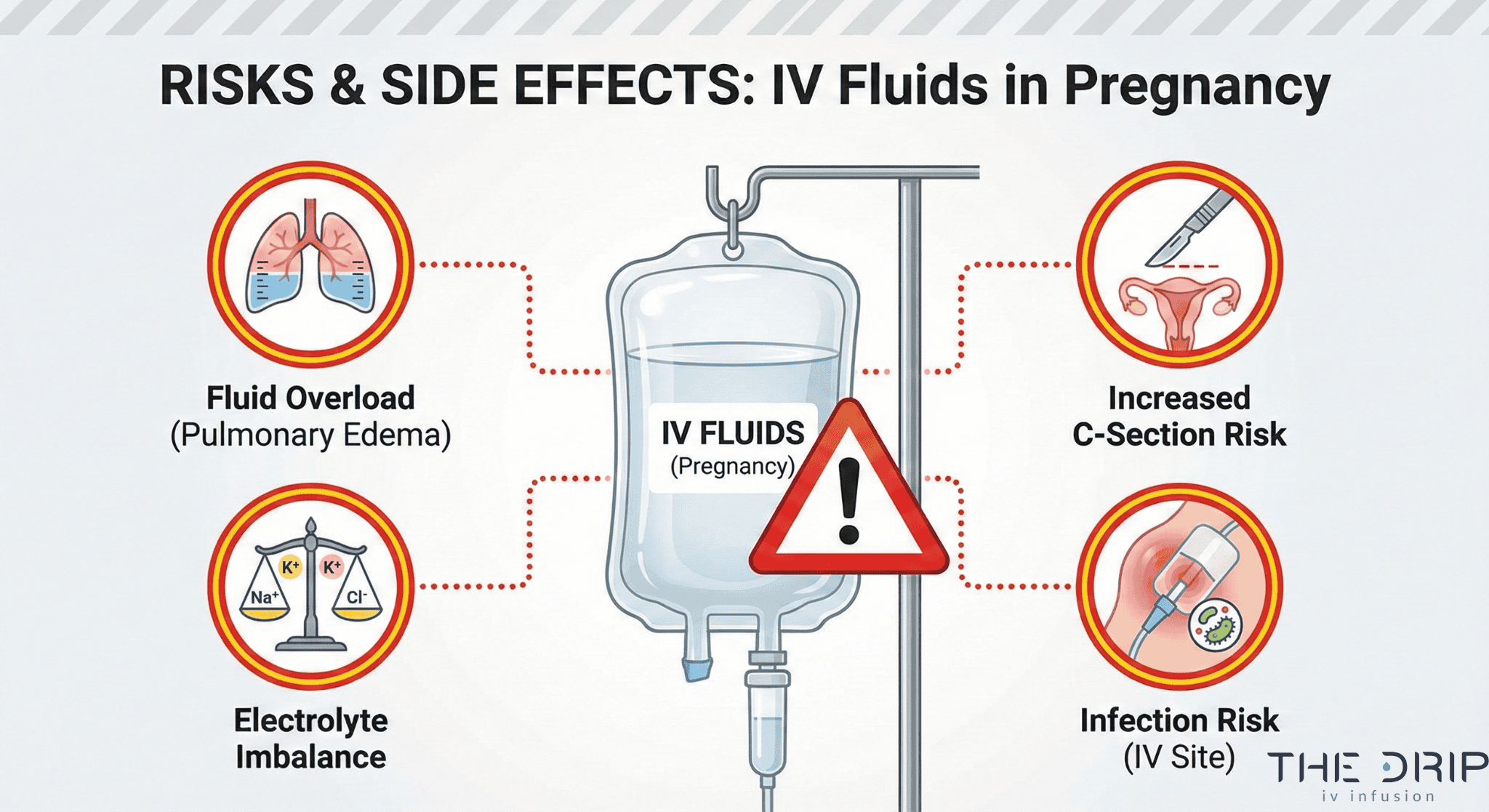
How Is the Safety of the Fetus Monitored During and After IV Therapy?
Doctors monitor your baby’s safety during IV therapy by continuously tracking the heart rate and doing ultrasound checkups. They use heart rate monitoring during IV therapy in labor and high-risk situations, like having a continuous window into how your baby is doing. Serial ultrasounds track amniotic fluid levels when treating low fluid problems.
Sugar solutions need extra careful management to prevent both you and your baby from having blood sugar crashes. These monitoring strategies work like early warning systems, catching any signs that your baby isn’t happy and adjusting treatment as needed to keep both of you healthy.
What Is an Amino Drip and How Is It Used During Pregnancy?
An amino drip is a specialized IV solution packed with essential building blocks your body needs – amino acids, fats, sugar, vitamins, and minerals – designed to provide complete nutrition when you can’t eat anything. During pregnancy, amino drips work like Total Parenteral Nutrition (TPN) for women whose complications make normal eating impossible. Let’s explore what’s in these drips, when they’re appropriate, and what research tells us about their use.
What Are the Ingredients and Benefits of an Amino Drip for Pregnant Women?
Amino acid solutions contain essential protein building blocks, fats, sugar, vitamins, and minerals that give your body comprehensive nutritional support. These components work together like a complete meal delivered straight to your bloodstream, maintaining your health and supporting your baby’s development when normal food routes fail completely.
The main benefit of amino drips during pregnancy is keeping you properly nourished for your baby’s growth when severe problems prevent normal eating. Essential amino acids support the protein-building your placenta and baby’s tissues need. The sugar component provides immediate energy, while fats supply crucial fatty acids your baby’s developing brain absolutely needs.
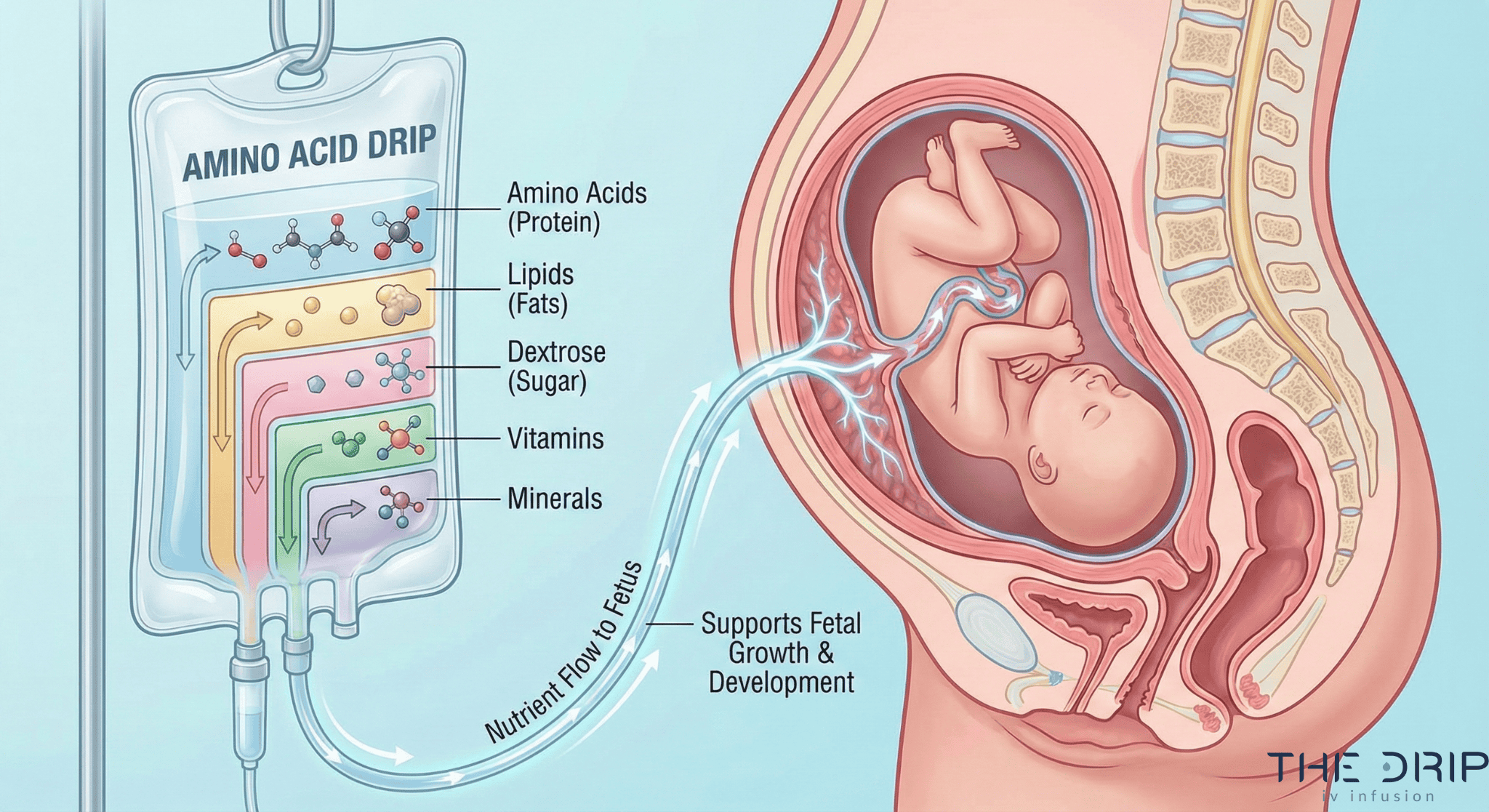
Are Amino Drips Recommended for All Pregnant Women or Only Specific Cases?
No. Amino drips are not recommended for all pregnant women and are reserved only for severe cases where normal eating is impossible. Medical professionals save amino acid solutions and TPN for severe morning sickness cases when you literally cannot tolerate any food or drink. Routine use isn’t recommended because of significant risks.
Healthcare providers carefully weigh these risks against benefits, typically trying everything else first before starting TPN. The decision requires close monitoring of your weight loss, ketone levels, and how your baby is growing.
Are There Research Studies or Guidelines About Amino Drip Use in Pregnancy?
Yes. There are research studies and guidelines about amino drip use in pregnancy, including landmark studies from 1988 through 2004 showing TPN can be safe and effective when medically necessary. Systematic reviews support amino acid supplementation in cases where babies aren’t growing well. Evidence for routine use does not exist. Current guidelines emphasize that TPN should be your last resort when all other nutritional support methods have failed. These findings give healthcare providers confidence when managing extreme pregnancy complications.
The research consensus shows amino drips are a valuable but specialized tool in pregnancy care, reserved for situations where your nutrition critically impacts your baby’s development and standard interventions just aren’t working.
How Can You Decide If IV Therapy Is the Right Choice for Your Pregnancy?
Deciding whether to use IV therapy during pregnancy requires carefully looking at your symptoms, medical history, and other options. A 2019 medical committee opinion says fluid therapy should be tailored to your individual needs rather than being routine for everyone. Your healthcare provider will assess how dehydrated you are, whether you can keep anything down, and your specific pregnancy complications to determine if IV fluids are necessary.
When Should You Ask Your Healthcare Provider About IV Fluids or Amino Drips?
You should ask your healthcare provider about IV fluids when you’ve lost more than 5% of your pre-pregnancy weight. If you can’t keep fluids down for 24 hours, you need evaluation for IV therapy. Signs like peeing less, feeling dizzy, or having ketones in your urine mean you need assessment. These symptoms suggest your body can’t maintain proper hydration through drinking alone.
What Alternatives Exist to IV Therapy During Pregnancy?
Alternatives to IV therapy during pregnancy include oral rehydration solutions as the first choice for mild to moderate nausea and vomiting. Medical guidelines encourage drinking fluids for low-risk women in labor to meet hydration and energy needs. Oral hydration lets you move around freely during labor instead of being tethered to an IV pole. IV therapy stays reserved for cases where you just can’t keep anything down due to severe symptoms.
What Questions Should You Discuss With Your Doctor Before Getting IV Therapy?
Questions you should discuss with your doctor before getting IV therapy focus on whether you really need it, what risks exist, and what alternatives you have. A simple checklist can guide your discussion.
- Do I medically need IV fluids or can I hydrate orally?
- What are the specific risks for my pregnancy?
- Are there safer alternatives?
- What are the costs or insurance considerations?
- How long would therapy last?
Understanding these factors helps you make an informed decision about IV therapy during your pregnancy.
How Does The Drip IV Infusion Approach Pregnancy IV Therapy?
The Drip IV Infusion approaches pregnancy IV therapy with specialized protocols that put both your and your baby’s safety first. Medical professionals at The Drip IV Infusion evaluate each pregnant patient’s unique needs before recommending any IV treatment. The clinic follows evidence-based guidelines to determine when IV fluids are medically necessary versus when drinking fluids is enough.
Can The Drip IV Infusion Provide Safe IV Fluids or Amino Drips for Pregnant Women?
Yes. The Drip IV Infusion can provide safe IV fluids or amino drips for pregnant women under specific medical circumstances with physician oversight. The clinic requires medical clearance from your obstetrician before giving any IV therapy during pregnancy. Normal saline and Lactated Ringer’s solution remain the primary go-to fluids for pregnant patients experiencing dehydration or severe morning sickness.
The Drip IV Infusion restricts certain vitamin additives and medications that don’t have pregnancy safety data. Amino acid solutions are saved for severe cases where normal eating proves impossible, such as unstoppable morning sickness with weight loss exceeding 5% of your pre-pregnancy weight. The clinic monitors your vital signs and ensures your urine output stays above 100 mL per hour during treatment sessions.
What Are the Key Takeaways About IV Fluids and IV Therapy During Pregnancy?
The key takeaways about IV fluids and IV therapy during pregnancy are that individualized assessment determines whether you need treatment, drinking fluids remains the preferred first approach, and routine IV fluids aren’t justified for low-risk pregnancies. A 2019 medical opinion says fluid therapy requires tailoring to your specific needs rather than routine administration. Guidelines specify normal saline with potassium for first-trimester severe morning sickness while advising against sugar solutions for dehydration.
A 2024 study revealed high-volume IV fluids during labor doubled cesarean section risk without reducing bleeding after delivery. Home-based IV therapy for severe morning sickness costs about one-fourth of hospital treatment ($708 versus $2,701 based on 1995 data), making outpatient services like The Drip IV Infusion economically advantageous. The growing medical consensus favors minimizing routine interventions in uncomplicated pregnancies while reserving IV therapy for documented dehydration, ketones in urine, or emergency situations.


